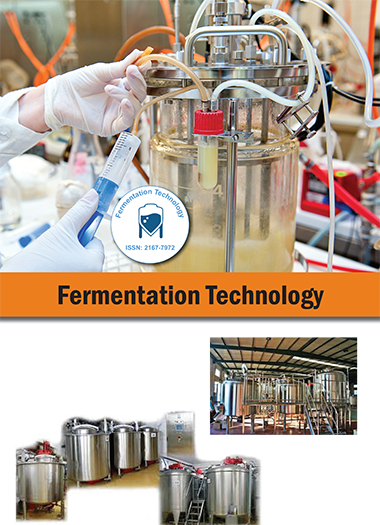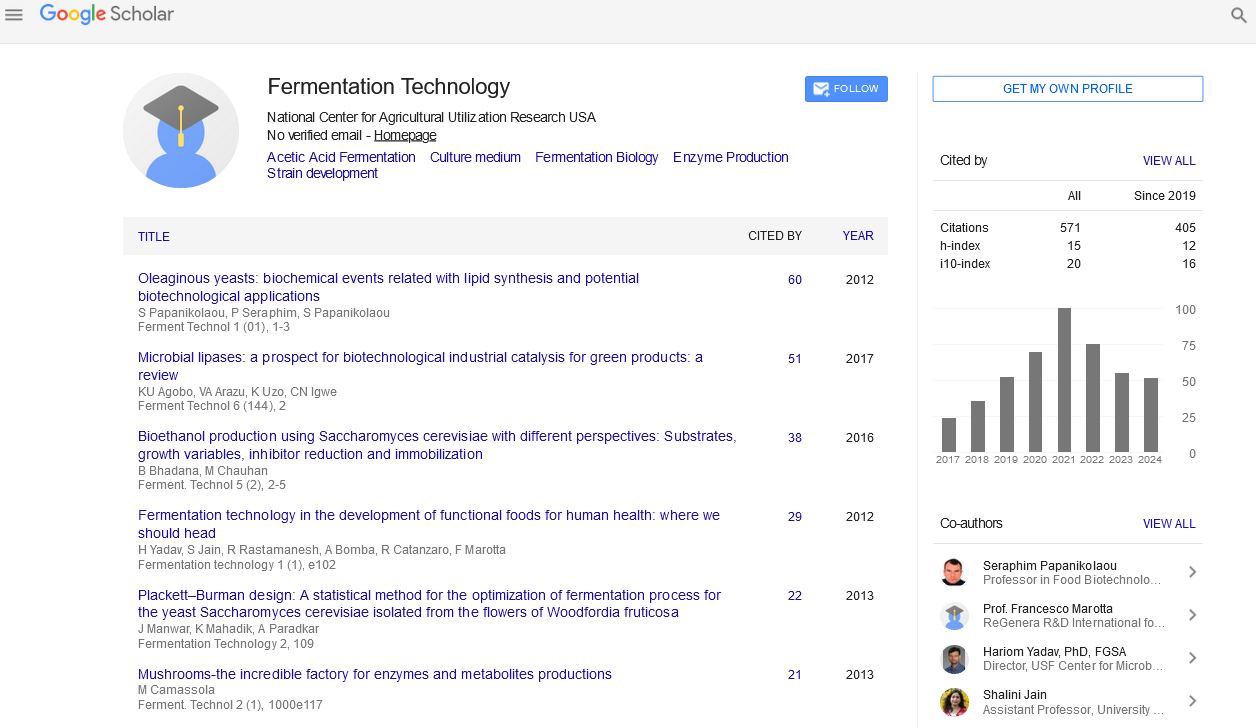Indexed In
- Open J Gate
- Genamics JournalSeek
- Access to Global Online Research in Agriculture (AGORA)
- RefSeek
- Hamdard University
- EBSCO A-Z
- OCLC- WorldCat
- Publons
Useful Links
Share This Page
Journal Flyer

Open Access Journals
- Agri and Aquaculture
- Biochemistry
- Bioinformatics & Systems Biology
- Business & Management
- Chemistry
- Clinical Sciences
- Engineering
- Food & Nutrition
- General Science
- Genetics & Molecular Biology
- Immunology & Microbiology
- Medical Sciences
- Neuroscience & Psychology
- Nursing & Health Care
- Pharmaceutical Sciences
Opinion Article - (2024) Volume 13, Issue 1
Fermented Dairy Products: Exploring their Impact on Inflammation and Health
Fatima Ahmed*Received: 26-Feb-2024, Manuscript No. FMT-24-25560; Editor assigned: 28-Feb-2024, Pre QC No. FMT-24-25560 (PQ); Reviewed: 13-Mar-2024, QC No. FMT-24-25560; Revised: 20-Mar-2024, Manuscript No. FMT-24-25560 (R); Published: 27-Mar-2024, DOI: 10.4172/2167-7972.24.13.176
Description
In recent years, more and more people have become interested in the potential health benefits of fermented dairy products, especially how they might affect inflammatory biomarkers. From yogurt to kefir, these probiotic-rich foods have achieved attention for their suggested role in modifying inflammation a fundamental factor in various chronic diseases. This opinion article aims to explore the current research regarding the effects of fermented dairy products on inflammatory biomarkers.
Diet and inflammation
Inflammation is a complex physiological response that plays a vital role in the body's defense mechanisms. However, chronic inflammation has been involved in the pathogenesis of numerous chronic diseases, including cardiovascular disease, diabetes, and certain autoimmune conditions. Dietary factors, including the consumption of processed foods and unhealthy fats, can make inflammation worse, while dietary patterns rich in fruits, vegetables, and whole grains have been associated with anti-inflammatory effects.
Fermented dairy products: A potential solution
Fermented dairy products contain live probiotic bacteria, which have been shown to use anti-inflammatory effects in preclinical and clinical studies. These beneficial bacteria, such as Lactobacillus and Bifidobacterium strains, interact with the gut microbiota and modulate immune responses, leading to reductions in systemic inflammation. Additionally, fermentation improves the bioavailability of bioactive peptides and other nutrients with potential anti-inflammatory properties.
Exploring mechanisms of action
Recent study has focused on clarifying the mechanisms uncovering the anti-inflammatory effects of fermented dairy products. Studies have identified various pathways through which probiotic bacteria and fermented dairy components modulate immune function and inflammation. For example, probiotics may increase the production of Short-Chain Fatty Acids (SCFAs) in the gut, which have anti-inflammatory properties. Additionally, fermented dairy products contain bioactive peptides that can reduce the production of inflammatory cytokines and promote the expression of antiinflammatory mediators.
Understanding these mechanisms is essential for optimizing the use of fermented dairy products in the prevention and management of inflammatory conditions. By resolving the complex exchange between diet, gut microbiota, and inflammation, researchers can develop targeted interventions that control the potential of fermented dairy products to promote health and well-being.
Significance for health and wellness
The potential anti-inflammatory effects of fermented dairy products have significant implications for the prevention and management of chronic diseases. Including these probiotic-rich foods into a balanced diet may offer a simple and accessible strategy for promoting overall health and reducing the risk of inflammation-related conditions. Furthermore, fermented dairy products can be part of a larger dietary pattern, such as the Mediterranean diet, which identifies whole foods and has been associated with anti-inflammatory effects.
However, it's essential to acknowledge that individual responses to fermented dairy products may vary based on factors such as genetics, microbiota composition, and overall dietary habits. Additionally, while fermented dairy products show promise in modulating inflammation, they should be considered as part of a general approach to health that includes regular physical activity, stress management, and other lifestyle factors.
In conclusion, the growing evidence supporting the anti-inflammatory effects of fermented dairy products provides new perceptions into their potential role in promoting health and wellness. While more research is needed to explain the mechanisms uncover these effects and to determine optimal consumption patterns, including probiotic-rich foods like yogurt and kefir into a balanced diet may represent a simple and practical strategy for supporting overall health. As we continue to investigate the complex connections between diet, inflammation, and disease, fermented dairy products stand as an area of study with the potential to positively impact public health.
Citation: Ahmed F (2024) Fermented Dairy Products: Exploring their Impact on Inflammation and Health. Ferment Technol. 13:176.
Copyright: © 2024 Ahmed F. This is an open-access article distributed under the terms of the Creative Commons Attribution License, which permits unrestricted use, distribution, and reproduction in any medium, provided the original author and source are credited.

